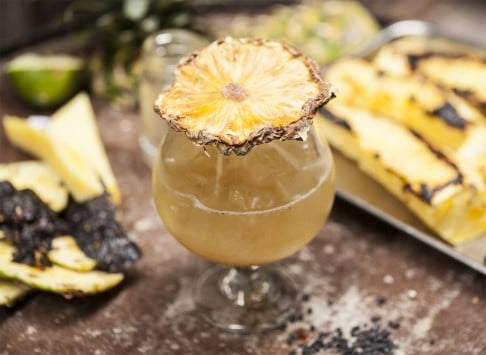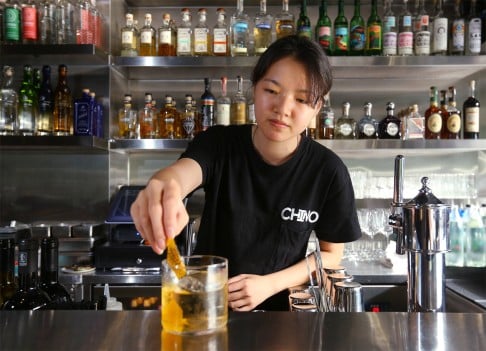Mezcal is the latest drink to catch on in Hong Kong with a growing number of shops and bars selling the spirit
Mezcal combines the best qualities of whisky, tequila and rum, and is making its mark, writes Christopher DeWolf

Elliot Faber breathes in deeply and takes a sip. “There’s a bit of star fruit, fresh, green, almost eucalyptus, then there’s chocolate, jalapeño, char from smoke.” The beverage manager of The Yardbird at Bridges Street in Western pauses before adding: “This is a pretty good breakfast mezcal.”

It’s a bright Sunday afternoon, but Faber is in the mezzanine of Sunday’s Grocery, a Kennedy Town deli and liquor store, surrounded by boxes of spirits. He picks up the bottle he just sampled: Derrumbes, a mezcal from the Mexican state of Michoacan.
Faber says he didn’t know much about the white spirit until his friend, chef Erik Idos, asked him to put together a mezcal list for his Mexican-Japanese restaurant Chino.
“I gave myself a really big crash course,” he says.
He ended up falling down the rabbit hole, putting together the biggest collection of mezcal in Hong Kong: 23 bottles. “My favourite part of learning about different kinds of alcohol is the process and the culture,” he says.
“There’s a lot of that with mezcal. You can count on more specificity between producers and villagers than even sake. It’s able to capture the spirit of a place in a single batch.”

Mezcal is a spirit like no other: smoky and savoury like an Islay whisky, fruity like tequila, with a hint of the caramelised sweetness of rum. It manages to combine all of these flavours into a single beguiling sip. Unlike tequila, much of which is produced on an industrial scale using blue agave from the state of Jalisco, mezcal is made by small family-run distilleries in seven Mexican states, with agave from any of nine different species. The agave is cooked for three days in pits of hot rocks, then crushed by a stone wheel turned by a horse before finally being left to ferment in large barrels, after which it is distilled.
This rustic process, geographic diversity and variety of ingredients means no two mezcals are alike, which has made mezcal the darling of the farm-to-table food world.

“Tequila got to the point where it’s like Tyson chicken,” Los Angeles-based mezcal importer Bricia Lopez told The New Yorker in April. “Now I want to know my chicken’s name. That’s mezcal.”
Not many people in Hong Kong care to know the name of the chicken on their plate, but mezcal is catching on with a small but growing number of shops and bars selling the spirit. One of them is Brickhouse, a boisterous Mexican bar and restaurant tucked into an alleyway off D’Aguilar Street. The restaurant stocks three types of mezcal, and drinks manager Lok Gurung says he plans to expand the selection. “Every couple of months somebody is bringing in a new mezcal,” he says. “I go to a lot of bars and not many are doing mezcal, but people here always want to try new things.”
A mezcal craze has already swept through North America and Europe, with mezcaleria opening everywhere from Vancouver to Paris. “Hong Kong is not far behind,” Gurung says.
One of the best things about mezcal is its versatility. Its smokiness makes it a satisfying wintertime drink, but it is light enough to enjoy in Hong Kong’s sweltering summer - as you would expect from a spirit that originates in the tropical highlands of southern Mexico.

It’s a star in cocktails, too. “With a bit of lime and ginger beer, mezcal is such a refreshing summertime drink,” Gurung says. The two mezcal cocktails he has created for Brickhouse go a bit beyond that. Mezcal plays a supporting role in the Cubano, along with wood-chipped smoke, reposado tequila, vanilla brandy, lemon and grilled pineapple. It takes centre stage in Rojo Lena, a new concoction that mixes mezcal with Lillet Blanc, strawberry, absinthe, pink peppercorn and lemon for a sweet, sour, smoky treat with spicy, herbal notes.

Gurung is partial to an off-menu bartender’s favourite: a Negroni with mezcal instead of gin. “Anyone who comes in and asks for a mezcal Negroni, they won’t have just one - like this guy who came in last Saturday, he had three,” Gurung says.
Chino serves mezcal cocktails like the Oaxaca Highball, which blends mezcal with grapefruit, and the Danzantes Highball, a mix of Los Danzantes mezcal with soda and burnt orange peel. La Bamba blends mezcal with tequila, fresh grapefruit juice and a touch of cinnamon.
“Mezcal is beautiful in an Old Fashioned, with agave syrup instead of sugar,” Faber says. “And umeshu and mezcal are best friends.” He mixes the two in the Santa Cruz cocktail at Japanese restaurant Ronin, where he also runs the drinks programme.
Faber says a good mezcal cocktail should highlight the spirit’s uniqueness, rather than forcing it to play along with too many other ingredients. “When you use vodka in a cocktail, you use it for its silence - not mezcal,” he says.

“You need to bring out that complexity, the smokiness.”
When it comes down to it, though, mezcal is a drink made for sipping. Chino’s selection includes single village mezcals that emphasise terroir, along with less common barrel-aged mezcals that have more of the vanilla and cinnamon flavour you would normally associate with an añejo tequila.
Because it is made in such small quantities with such an artisanal process, a single bottle of mezcal can cost thousands of Hong Kong dollars.

Most servings at Chino cost between HK$100 and HK$200. But Faber says it is worth the cost as much as any dram of single malt Scotch or rare Japanese whisky.
He sets down his glass of Derrumbes and contemplates it for a moment. “It has that savouriness that keeps going.”
Chino, 1B Kennedy Town New Praya, chinohk.com
Brickhouse, 20 D’Aguilar Street, brickhouse.com.hk
